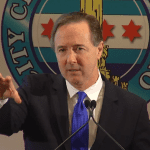My fellow Illinoisians will be aware that one of the proposals of new governor Bruce Rauner that’s in the news is his proposal for a two-year freeze in property taxes.
“Two keys to this: We’re going to give more state support for education. That eases up on the property tax burden, No. 1,” Rauner said at his stop in Troy. “And No. 2: We’re going to empower local voters to get control of their local government costs and shrink the bureaucracy of the local governments. That frees up money for education. So it’s a two-pronged approach: more state support and more local voter control of their government costs.”
A handout that accompanied Rauner’s State of the State message says the governor wants to freeze property taxes for two years. During that time, the total amount of property taxes collected by taxing districts would not increase, with few exceptions, such as new construction.
An individual property owner’s bill would likely remain the same unless, for example, there were an addition or other improvements that pump up the property’s value. Voters could break the freeze if they wanted to increase funds for a local government or school.
So, with respect to his “key No. 1”: the state is enough financial trouble just paying its current obligations that it’s hard to see how Rauner can be promising more state money. (Most recent headline: the state can’t afford to pay its share of a program that provides funds for daycare for poor families. Here’s a “fact sheet” from an advocacy group because those same headlines didn’t lead to stories with the relevant background.) Yes, it would be a good thing to fund schools from other sources than property taxes, but not if the funds aren’t there in the first place.
With respect to No. 2: this seems to be the key. Have voters approve the amount of increase in the budget of each governing body? There already are tax caps for schools — I can’t seem to find the details easily but, from memory, schools cannot increase their overall intake from one year to the next by more than the increase in CPI, with some exceptions, without voter approval. Rauner is basically proposing to freeze local budgets, or require that they find additional revenue sources (e.g., local sales taxes). Now, are there ways that schools could reduce expenses? Certainly. Do schools even have a mindset of “spend every available dollar I can collect”? Most likely. Could the state take a Walker-like approach to helping school districts which are trapped into paying high wages and benefits for teachers, with work rules that further increase costs? Maybe. (Though – realistically – not with a Democratic supermajority in the legislature.) Are there even roadblocks to the local citizenry having input into decision-making, and plenty of cases of corrupt local governments? Most certainly.
But you can’t put the cart before the horse, and you can’t equally penalize local governments which have been running responsibly just in order to apply a penalty on the corrupt and/or free-spending ones.
(By the way: I’ll get to the consumption tax, and why I don’t think it would work, or be the right approach if it did, later.)











